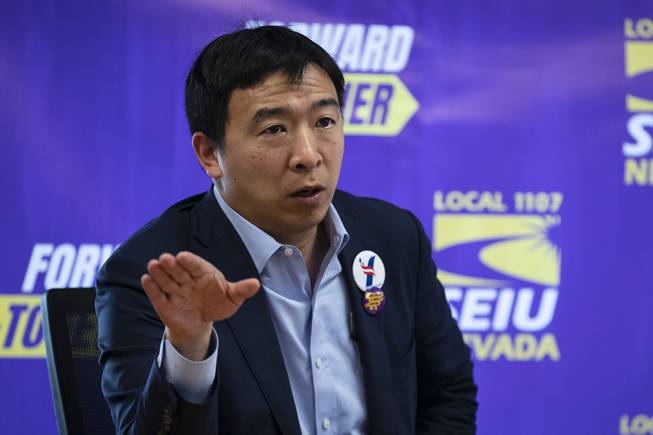
Democratic presidential candidate Andrew Yang speaks during the Humanity First Tour at Nevada Service Employees International Union in Las Vegas Wednesday, April 24, 2019.
Tuesday, Oct. 29, 2019 | 2 a.m.
Businessman and 2020 Democratic presidential candidate Andrew Yang said automation is going to cost an increasing number of workers their jobs, and Las Vegas is “ground zero” for the problem.
Many jobs in Nevada — such as those in the hospitality industry and at call centers — are particularly susceptible to automation, Yang said in an interview with the Las Vegas Sun.
“If you look at the composition of jobs here in Las Vegas, there’s a reason why experts say that this is ground zero for automation and that Nevada is the No. 1 state in the country for the proportion of jobs that will be lost to automation in the days to come,” Yang said.
Nationwide, experts project 20% to 40% of jobs might be subject to automation over the next 10 to 20 years, Yang said.
“I spoke to a group of about 70 CEOs in New York City and asked how many of them are looking at having artificial intelligence replace back-office clerical workers and call center workers, and all 70 hands went up,” he said.
Oftentimes, Yang said, the go-to response from politicians for combating automation is job retraining for displaced workers, which he called “essentially a fantasy.”
“The problem is that we are terrible at retraining, and the best studies show that it will work on between 15% and 25% of workers,” Yang said. “The fact is we are not infinitely retrainable and adaptable — we’re just human beings.”
A better solution, Yang said, is what he calls the “freedom dividend” — a $1,000 a month stipend for every citizen.
Yang said his proposal would infuse communities with more expendable income and create tens of thousands of jobs as a result.
“If you imagine a Nevada where everyone is getting $1,000 a month, where would the money get spent in real life? It would get spent on local restaurants and day care and car repairs people have been putting off and Little League sign-ups and local nonprofits,” he said.
“It supports and provides a foundation for localized economies, so that instead of closing, maybe the store stays open or maybe the store becomes a different type of business,” Yang said.
